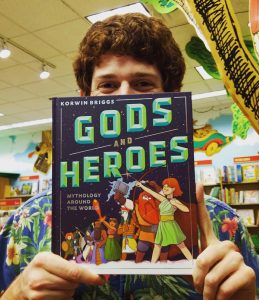Its full title is Gods and Heroes: myths around the world. It has cool stories and lots of pictures – a must for any book of mine.
Why a book about myths? (from the Introduction) “Myths are the traditional stories of a culture… we can see a reflection of the people who wrote them – what they thought of the world and themselves, how they were different from us, and how they were the same… (and) why might this culture have thought it was important to continue telling this tale, year after year, generation after generation.”
Think of today’s stories: George Washington’s “I cannot tell a lie” about the cherry tree; Lincoln walking miles to return change to a customer; Teddy Roosevelt and the Rough Riders charging up San Juan Hill; even JFK and PT 109. Whether myths or historical facts, they reflect who we are or want to be.
What separates history and myth? Probably time and who’s doing the telling.
My book describes myths and heroes from thousands of years ago in stories that reflect past cultures and, in small ways, tease the cultures of today.
For example, before there was Babe Ruth or Joe DiMaggio, there was Heracles (p. 107), “the most popular hero to come out of Greek mythology”. Somewhat like the Eagles’ 17 game path to the Super Bowl immortality, Heracles was given 12 tasks to accomplish for personal immortality. Instead of demolishing the Cowboys 27-13, though, one of Heracles’ tasks was to clean all the stables and grounds of King Augeas, “who owned the largest animal herds of all of Greece as well as the most poop-filled stables.”
(Did I mention my book was written to entertain and educate middle schoolers? Works, doesn’t it.)
Like Boston’s shock at 2ndstring Nick Foles’ superior passing, which immortalized him in Philadelphia, King Augeas didn’t expect Heracles “to divert a river to do the cleaning for him”, which immortalized Heracles in Greece.
There is the story of Leizu (p. 140), wife of the Yellow Emperor of China. “One afternoon she discovered some cocoons in a mulberry tree.” When one fell into her tea, “the hot water made the cocoon unravel, and she pulled and pulled at the string… to make silk threat and fabric”.
Far-fetched? How long will it take for the more recent story of making thread from a spinning wheel to feel like a myth?
And then there is the Greek god Zeus (p. 285), “god of kings and king of gods…ruling gods and mortals alike with a muscular arm and a fist full of lightning bolts.”
Being a god didn’t make Zeus a good guy, though, because, “while he may be married, Zeus had enough affairs and children to put him at the center of any Greek family tree.”
Today’s parallel? I just read about Eddie Murphy having 5 wives and 10 kids. (Just saying…)
The Romans liked Zeus so much, they copied his myths for their own god, Jupiter.
You’ve heard, I’m sure, of the Achilles’ heel. (p.10) “It’s named after Achilles, a Greek hero from the Trojan War (in which Greek soldiers hid in a large wooden horse statue which they gave to the Trojans and then, at night, climbed out and killed all the Trojans.” Thus the “Trojan Horse” of today.)
Anyway, back to Achilles. “When he was a baby, his mother dipped him in magical water that would make him invincible…except the heel she held him by. He grew up to be one of the greatest warriors of his age, undefeated until he was shot in the heel with a poisoned arrow during the Trojan War.”
And let’s not forget Inanna (p. 115), “the subject of one of the oldest love poems in human history, but it’s a little too risque to repeat here.” (Middle schoolers, remember).
I recommend you get this book, not because it’s my book, because it really isn’t. Well, it is, really, because I bought it the day it came out. On the other hand it isn’t, because I’m not the one who wrote and illustrated it. I can’t draw – a thing – and I sure as heck can’t write 300 pages about anything, especially gods and heroes.
However, I did bounce on my knee the young Briggs who grew up to write and illustrate it.
